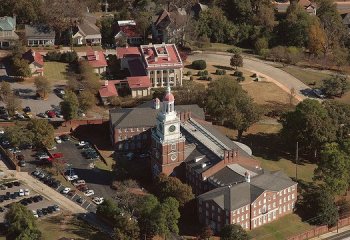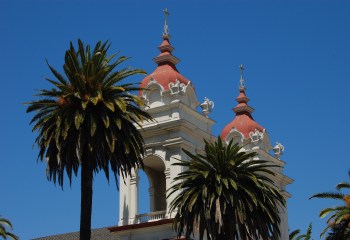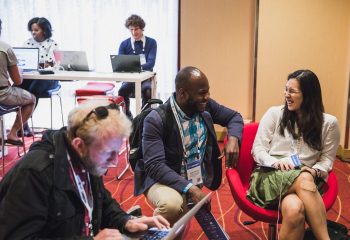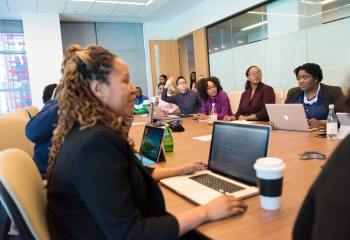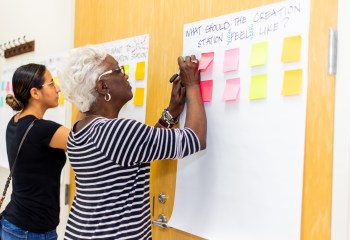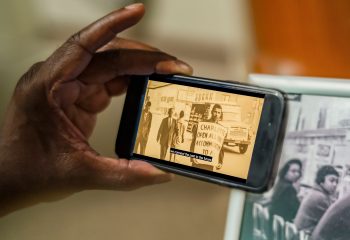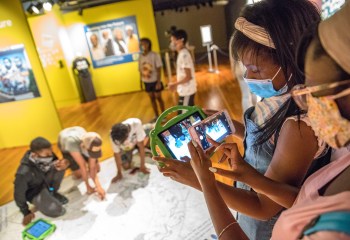To support AI Justice in assisting qualified persons from Haiti and Venezuela in obtaining rights and becoming able to engage in the community by applying for Temporary Protected Status (TPS).
Program Area: Community Impact
To develop a digital application and augmented reality (AR) experience that fosters community engagement in the North Broad, Philadelphia, revitalization efforts.
To support Catholic Charities Legal Services in assisting qualified persons from Haiti and Venezuela in obtaining rights and becoming able to engage in the community by applying for Temporary Protected Status (TPS).
To support MCCJ as it undergoes a leadership transition and strategic planning process to reimagine its mission of advancing understanding and respect among all cultures, religions and races in Miami.
Local nonprofit NewTown Macon intends to provide loans and training for women and members of the Black community to start businesses and create jobs.
MACON – Aug. 4, 2021 — To expand Black and women-owned business in Macon’s urban core, NewTown Macon will distribute loans and provide entrepreneurial training to women and communities of color to start more local ventures thanks to a $1.5 million investment from the John S. and James L. Knight Foundation.
Knight has long supported the renewal of Macon’s urban core through economic development, revitalizing downtown and helping establish community centered public spaces.
Our latest commitment will advance NewTown Macon’s work:
- $500,000 – To support the start up of NewTown Loans, a recently certified Community Development Financial Institution, which will give women and Black entrepreneurs access to loans, lines of credit, and investment opportunities to start new businesses and to create more jobs. Knight’s commitment supports start-up costs for NewTown Loans and for staff members who will offer consulting to loan applicants.
- $1M – To contribute to NewTown Macon’s Godsey Initiatives Fund, a program that helps coach individuals looking to start a business and provides funding after the entrepreneurial training has been completed. NewTown Macon has been offering loans that are typically not available from traditional lenders.
“This latest investment from Knight builds on a consistent strategy that has inspired NewTown to amplify our successful revitalization efforts beyond what we initially dreamed possible,” said Josh Rogers, president and CEO of NewTown Macon. “Through Knight’s support, we’ve been able to equip our staff with the knowledge and resources to expand our lending to make a greater impact in the community, building sustainable relationships with our local entrepreneurs and developers.”
A total of 160 local businesses — shops and restaurants — call downtown Macon home. But only 18% of those businesses are owned by Black entrepreneurs, despite Black residents making up 54% of Macon’s population.
Knight’s current investment seeks to turn the tide by supporting the Macon Action Plan 2.0 The plan cites this disparity and includes strategies to build a more inclusive Macon, such as growing the number of Black-owned businesses in downtown.
“Saving downtown Macon was no small miracle, but developing a truly integrated downtown where business and building ownership is shared by women and people of color will be an even bigger success,” said Bethany Rogers, executive director of NewTown Loans. “Forming a CDFI will remove obstacles for all sorts of entrepreneurs and developers to start businesses, invest in property downtown, boost diversity and build generational wealth.”
In 2017, Knight made an initial investment of $500,000 in the Godsey Initiatives Fund, which allowed NewTown Macon to start laying the groundwork for building an equitable lending framework for communities that had been historically excluded in Macon.
“Knight Foundation sees this latest investment driving our strategy for Macon,” said Lynn Murphey, Knight’s Macon program director. “One of the most special things about downtown Macon’s renaissance has been that local people create these projects and local people benefit from them. This investment will ensure we’re equipped to continue supporting Maconites inclusively.”
Last month, the Macon-Bibb County Commission approved $1.6 million in American Rescue Plan Act funds to NewTown Macon and the Historic Macon Foundation to increase affordable housing by building new rental units and empower local residents to take part in renovating existing ones. Knight Foundation matched these funds dollar for dollar, totaling $3.2 million in support for these organizations.
NewTown’s services are available to all residents in Macon-Bibb County, though projects must be located in Macon’s urban core. To get started, applicants need to fill out an intake form at www.newtownmacon.com/loans. NewTown will schedule a time to meet with clients and build a custom approach to help applicants complete a successful plan, apply for funding and leverage their financing to grow a business or develop real estate.
###
About the John S. and James L. Knight Foundation
Knight Foundation supports democracy in America by fostering informed and engaged communities. The foundation invests in journalism, arts and culture in community, research in areas of media and democracy, and in the success of cities and towns where John S. and James L. Knight once published newspapers. For more, visit kf.org.
About NewTown Macon
For 25 years, NewTown Macon has led the revitalization efforts of downtown Macon. NewTown’s mission is to attract, leverage, and invest in self-sustaining transformation with the vision of a vibrant and authentic city experience unparalleled in the South. For more information, please visitwww.newtownmacon.com.
Image (top) of Materra Drafts, owner of Nice 385 and Recess Bar & Lounge in downtown Macon.
How can we use data and analytics to empower decisions that build more equitable city services for underserved members of the community? And how can we build a lasting framework that enables city officials and other everyday stakeholders to make data-driven decisions that build equity and establish a culture shift that can be sustained regardless of changes in leadership?
As America’s 10th largest city and one of its most diverse, the City of San José’s work to help make experiences for underserved residents in the city more equitable is an exciting template for others in the public sector.
2020 presented a cultural and health crisis in San Jose that made deep equity gaps in the community more explicit and consequential. Many city services—like planning, nutrition, education, permits and hosting of city meetings—shut down and shifted online. This shift created equity for San Joseans because they could engage with the City from anywhere, at any time. But for residents who couldn’t connect online, getting services became more difficult.
The City recognized that addressing these crises required innovative thinking. Mayor Sam Liccardo and the City Council created the Office of Racial Equity (ORE), which is responsible for advancing systems change through a citywide racial equity framework that examines and improves San Jose’s internal policies, programs and practices to eradicate any structural and/or institutional racism in the City of San José.
However, ORE and the City were limited to historical data and data models, like census and survey data, which aren’t (and weren’t) sufficient in serving residents efficiently and effectively—or to address the growing equity divide that was creating real suffering for San Joseans. And while these data points helped City departments locate themselves in the big picture of how well they were fulfilling residents’ needs, the results were most useful to those leading the departments. There wasn’t always a clear plan of action for city program managers and staff who interact daily with residents. The City shifted its thinking to a “bottoms-up” approach that centered the operations of different departments: How could we understand how data could be used to shape resource allocation and decision making to reduce suffering and build equity immediately?
With support from the Knight Foundation, the Mayor’s Office of Technology and Innovation (MOTI) recruited a Harvard Business School Leadership Fellow, Christine Keung, to develop a pilot program that could bring rapid insights to City departments. She proposed a pilot built around three objectives:
- Unlock potential: Analyze existing administrative data rather than survey data.
- Targeted solutions: Create operating metrics that enable policymakers, decision-makers and City staff at every level to understand how their decisions impact equity.
- Equity goals: Build a data equity framework that creates consistency, transparency and accountability for City staff and leadership to achieve equity goals.
One of the first pilots MOTI’s data equity team launched was with San Jose’s Parks, Recreation and Neighborhood Services (PRNS) department to understand the distribution and value of the thousands of program scholarships for San Jose youth. The scholarships are for programs such as Recreation of City Kids (ROCK) After School, which offers activities from playtime to homework assistance for children, and summer camps like Camp San Jose, which provides half or full day programming that encourages friendship, skill building and learning for youth of all ages. Beyond analyzing the number of eligible families they were serving year over year with the scholarships or looking at residents’ proximity to the community centers that offered these youth programs, the data equity team tried to understand the accessibility of child care for the families who could benefit the most. By clarifying the concentration, distribution and use of scholarships around the city, PRNS can build future scholarship programs in ways that precisely target distribution and build equity.
Since Keung joined the City in the summer of 2020 as a data equity team of one, they’ve grown to more than a dozen talented individuals that represent the diversity of the communities they serve — in technical ability, ethnicity, culture and heritage. Christine and her team have presented this work in academic and business forums, which has created a strong and diverse talent pipeline into the city.
The MOTI team is also focused on the user experience of day-to-day decision-makers, such as City staff at all levels, to ensure that their data insights are presented in comprehensible and actionable ways. Rather than building dashboards for elected officials who could only set future policy, the team built customized views for city staffers who make everyday decisions. The next step is to build capacity and expertise within City departments by training existing staff to sustain this analytical knowledge, so they have the understanding and ownership of equity data that is most impactful to their programs.
To date, MOTI’s data equity team has completed six data projects over the course of six months for four separate City departments using this equity framework. Their work has now emerged as a priority that was reflected in the Mayor’s 2021 Budget Vision. It is also informing future investment opportunities for Knight’s priority of building an informed and engaged San Jose through a diversity, equity and inclusion framework.
The MOTI team is in the process of presenting personalized data insights for each member of the San José City Council, so that they can better understand their constituency and expand their public investments to build equity for San Joseans. Data equity fellows from MIT’s Priscilla King Gray Public Service Center and Princeton’s Public Interest Technology Summer Fellowship are also leading outreach efforts to build trust, create a system for community feedback and help shape the delivery of City programs. In the span of two weeks, they’ve contacted 300 community groups and scheduled over 40 meetings with faith-based organizations, educational institutions and cultural centers.
Though their work has only just begun, we’ve already gained a wealth of information on how to build an engagement strategy that is more responsive to those most impacted by decisions made within City Hall. MOTI’s data team’s work is helping our city take big steps toward building experiences and interactions with city services for our residents that are more equitable and inclusive.
To learn more, please join Jordan Sun, San Jose’s Chief Innovation Officer, for a discussion about MOTI’s work during Knight’s Smart Cities Lab 2021 on July 29 and 30. The virtual workshop will help community leaders and technologists explore how to leverage federal funding, data and digital technology to help make strong decisions and improve quality of life for residents in 2021 and beyond. Register here.
Christine Keung, is MOTI’s Chief Data Officer; and Chris Thompson is Knight Foundation’s San Jose program director.
Image (top) by Recreation of City Kids (ROCK) After School
To support a series of conversations with business, civic and government leaders on the role of technology in supporting democracy across the Americas.
NewTown Macon and the Historic Macon Foundation will increase affordable housing in Macon-Bibb County by building new rental units and renovating existing ones with investments from Macon-Bibb County’s American Rescue Plan Act (ARPA) funds and a matching grant from the John S. and James L. Knight Foundation. The grant announcement was made on Monday, July 19 and the Commission approved the ARPA funds on Tuesday, July 20. To watch the full announcement, click here.
Macon-Bibb’s use of ARPA funds is part of a more than $18 million plan to help the community, including creating affordable housing, addressing food deserts, attacking blight and more.
Knight’s strategic investments in Macon focus on supporting an inclusive downtown for all residents to live, work and connect with each other, which aligns with the priorities of the community-driven Macon Action Plan. The grants are for $1 million for NewTown Macon and $600,000 for Historic Macon, thus doubling the amount they will have available to create affordable housing.
“This is a once in a lifetime opportunity to make transformational change in people’s lives for years to come,” says Mayor Lester Miller. “This is work that is going to lift our entire community.”
“This is a pivotal moment in NewTown’s history, to be able to transition from the central business district to the attached neighborhoods and be able to make a difference,” says NewTown Macon President and CEO Josh Rogers.
“We know that healthy and thriving neighborhoods must have a mix of housing options, so we are delighted to be investing $1.2 million in quality, affordable, rental housing in the Beall’s Hill community,” says Historic Macon Foundation Board Chair Gerri Marion McCord. “The initiative has been a priority for Historic Macon for several years, but the impact of COVID on our Macon neighbors has pushed this housing option to the top of the priority list.”
“Knight supports inclusive, equitable, and engaged communities, so we are thrilled to invest in an initiative where neighborhood residents are so deeply involved in the creation of more affordable housing,” said Lynn Murphey, Knight’s Macon program director. “We have worked with both NewTown and Historic Macon and have seen the impact of their work in community. This alliance between residents, nonprofits and local government can be a model for other cities seeking to make transformational change in people’s lives.”
NewTown Macon intends to use $2 million to help residents become entrepreneurs. They will help people renovate and rent blighted properties by training them to build and rehabilitate investment property in their neighborhoods. NewTown will also establish a revolving loan program to support residents’ purchase and renovation of 20 blighted urban core properties that will then be rented out at affordable rates by residents.
Historic Macon plans to use its $1.2 million to build 12 to 16 affordable rental units in the Beall’s Hill community by Spring 2022. It aims to increase quality, affordable rental housing to meet demand and combat blight in the area as the next step in the neighborhood’s ongoing revitalization. The investment will also create an ongoing rental housing revolving fund for the organization to use in other neighborhoods.
###
About the John S. and James L. Knight Foundation
Knight Foundation is a national foundation with strong local roots. We invest in journalism, in the arts, and in the success of cities where brothers John S. and James L. Knight once published newspapers. Our goal is to foster informed and engaged communities, which we believe are essential for a healthy democracy. For more, visit kf.org.
About NewTown Macon
For 25 years, NewTown Macon has led the revitalization efforts of downtown Macon. NewTown’s mission is to attract, leverage, and invest in self-sustaining transformation with the vision of a vibrant and authentic city experience unparalleled in the South. For more information, please visitwww.newtownmacon.com.
About The Historic Macon Foundation
Founded in 1964, Historic Macon Foundation is a nonprofit organization that revitalizes Macon by preserving architecture and sharing history. For more than 56 years, Historic Macon has been engaged in community revitalization efforts and has led the nation in innovative tactics for historic preservation. For more information, visit www.historicmacon.org.
To redesign and redevelop president-facing digital products in city halls across four KFcommunities.
On June 29, 2021, Knight announced $1.2 million in new investments to foster a more digitally connected, vibrant and equitable Charlotte. Knight’s Charles Thomas and Lilian Coral share more below.
During COVID-19 and the pandemic-driven recession, Charlotte’s population and economy continued to grow, allowing us to pass San Francisco as the 15th largest city in the U.S. This is a statistic to be proud of during a time when cities across the country are experiencing deficits and decline.
However, the prosperity of our city was not equitable in 2020. Black and Brown residents living in historic neighborhoods were ravaged by COVID-19, and students and parents without access to the internet found themselves cut off from education and economic opportunity.
Since 2015, Knight Foundation’s strategy in Charlotte has been focused on ensuring residents are participating and benefiting from the development of their neighborhoods. We support community engagement, building the capacity of resident-led organizations and strengthening civic and public spaces that are equitable, inclusive and allow residents to get fresh air and get to know each other. Additionally, Knight Foundation has been investing in a Smart Cities strategy to harness digital technology to improve how communities respond, connect to and engage with residents.
The pandemic forced cities and organizations across the world, including Charlotte, to recognize the need for digital infrastructure and engagement initiatives that are designed with and for residents.
To help ensure residents and resident-led organizations continue to play a key role in the development of their neighborhoods, we’re announcing $1.2 million in new investments to support eight digital-engagement initiatives that will help to advance economic mobility and build a more equitable and inclusive Charlotte. Our investments support closing the digital divide, engaging residents to plan the future of the city, and reminding residents of our shared past in Black communities.
Our latest commitments highlight our belief that resident-centered digital engagement is crucial to the advancing more informed and engaged communities. It also recognizes Charlotte as a national leader in developing resident centered technology and engagement strategies and practices.
For example, Charlotte is pushing the bounds of digital engagement using augmented reality to inform and engage residents in the future design and development of the city. Johnson C. Smith University and the Levine Museum of the New South are creating virtual history tours of Brooklyn and West End neighborhoods that bring stories of Black resiliency and prosperity to life and remind us of how previous development policies destroyed Black communities and displaced residents. While at the same time, Knight grantees — North End Community Coalition, Digital Charlotte and Charlotte Mecklenburg Library — are leading efforts to ensure all residents have access to the internet and the technology.
As our city reopens, we hope our investments will reinforce Charlotte as a Smart City leader that puts residents at the center of shaping the design and use of digital technologies and advances economic opportunity and prosperity for all residents.
Charles Thomas is Knight’s program director in Charlotte; and Lilian Coral is Knight’s director of national strategy and technology innovation. Follow Charles on Twitter at @cthomasclt and Lilian at @lcoral.
Image (top) by Grant Baldwin Photography
A $1.2 million investment in several digital engagement initiatives is helping connect the people of Charlotte and build a more inclusive community.
In an increasingly connected world, technology can serve as an effective tool to strengthen civic engagement. The John S. and James L. Knight Foundation has committed more than $1.2 million in digital inclusion, immersive technology and smart city projects in Charlotte that put people at the center of the decision-making process for community development.
Knight Foundation’s latest investments in the space of technology innovation in Charlotte Includes support for a Smart City Fellow who will lead local smart city strategies, efforts to bridge Charlotte’s digital divide, a digital platform to help residents visualize growth opportunities for the city and several projects that use immersive technology to recreate Charlotte’s rich history.
“Immersive technologies and smart city strategies directly play a role in building a more informed and equitable Charlotte,” said Charles Thomas, director for Knight’s Charlotte program. “By using tech to experience and learn about our city’s history, for example, individuals can become more engaged and more committed to Charlotte’s future. Likewise, smart city strategies ensure that city services effectively serve Charlotte’s residents, and ensuring that everyone is connected is a key part of our work.”
Here are more details about the grantees and their initiatives:
- Foundation for the Carolinas ($458,000): To support digital literacy efforts for students and parents in Charlotte-Mecklenburg County’s Central District 1. After the grant was disbursed, the Foundation for the Carolinas directed the funds to support Charlotte Mecklenburg Schools’ Project L.I.F.T, a public-private program aimed at boosting academic success in the Charlotte Mecklenburg County School District. Project L.I.F.T. provided 1,600 laptops to students and several digital literacy training programs for parents across the district as a response to the pandemic and to meet the needs of online learning.
- City of Charlotte, Smart City Fellow ($245,000): To support a Smart City Fellow for the City of Charlotte who will help increase local smart city strategies that boost equity and engagement. The Fellow will help create a strategic framework to guide Charlotte’s smart city strategies for the next three to five years. The strategic framework will allow smart city work to continue beyond the tenure of the Smart City Fellow and ensure a structured approach to accelerate the work.
- University of North Carolina Charlotte, Immersive Visual Data ($239,871): To develop a digital platform that uses visual data to put residents at the center of the decision-making process in the Charlotte Future 2040 Comprehensive Plan. The Comprehensive Plan guides how the City of Charlotte will grow and invest over the next 20 years. By using an extended reality platform, residents will be able to visually explore growth options and impacts in the City through visuals, including 3D visualizations, augmented reality and virtual reality. The data project allows residents, including under-represented groups, to play an active role in the development of the Comprehensive Plan.
- Johnson C. Smith University ($75,000): To help the university’s library create a proof of concept for “A Virtual Sense of Place,” a web-based augmented reality exhibit that tells the story of development in the Historic West End. The project merges historic artifacts and cutting-edge technology to recreate historical African-American urban spaces in Charlotte, including those that were razed through urban renewal in the 1960s. The result will bring to life stories of displacement but also of rebuilding and resilience, while engaging residents to learn about and participate in the Historic West End’s current development process.
- City of Charlotte, North End Smart District ($60,000): To create a phone application that will improve data collection to enhance the visitor experience at the Urban Arboretum Trail, a collection of parklets and open spaces that preserve Charlotte’s tree canopy. The app will be developed by the City of Charlotte’s Urban Designer Center and Potions and Pixels, a nonprofit that utilizes games to create social impact. The initiative aims to engage youth to solicit ideas for the phone application and will pair coding experts with people interested in career pathways in coding.
- North End Community Coalition ($50,000): To support the development of programming and hiring of a community manager at the North End Smart District Tech Center (NEST) to improve digital literacy. Proposed by the North End Community Coalition, the NEST is slated to open in Charlotte’s North End Smart District in 2020 as a central tech hub for residents and to support continuous smart cities initiatives in Charlotte. Knight support will allow for technology programming that will improve digital literacy for residents. It will also assist in identifying community needs and objectives to better design smart city programs that cater to local needs. Furthermore, the NEST’s community manager will help establish the center as a technology hub where locals can learn more about smart city and tech initiatives, network and exchange ideas.
- University of North Carolina Charlotte, Virtual Neighborhood Walk ($48,109): To develop virtual walking tours around historic neighborhoods in the City of Charlotte that engage residents with their cities’ history. Knight’s investment supports research by faculty and students at the University of North Carolina Charlotte to develop the online platform, the collection of historical images, video, audio and other media, and collaboration with consultants to ensure the application of cutting-edge virtual reality and digital mapping technology. The project is a collaboration with the Levine Museum of the New South, which will recreate the historic Brooklyn neighborhood; Johnson C. Smith University which will focus on the Historic West End; and Charlotte Planning which will look at the Urban Arboretum Trail. In each case, the tours will be conducted remotely via an online platform that will serve as a one-stop portal that brings Charlotte’s rich history to life through mapping, web visualization and storytelling.
- Queens University of Charlotte ($44,550): To help the Knight School of Communication’s Digital Charlotte program with advancing digital inclusion in the North End Smart District providing digital literacy training and laptops to residents. Knight’s investment will allow Digital Charlotte to purchase 21 laptops and 21 hotspots to expand the North End Community Coalition’s Technology Lending Library, which lends laptops and WiFi hotspots to residents. The Digital Charlotte program will work in conjunction with NECC to conduct a series of digital literacy workshops for North End residents.
“What we’re seeing in Charlotte is unique in the country,” says Lilian Coral, Knight’s director for national strategy and technology innovation. “Charlotte is modernizing not just the way it approaches city services, but also the way it engages residents. Cutting-edge technology is playing a key role in bringing in people into the development process of community strategies to ensure equitable opportunities, ensuring that their needs are met and that they take a decisive role in the City’s growth”
Knight leverages economic growth in Charlotte to support the evolution of the Historic West End into an inclusive and thriving residential, commercial and university corridor. Since 2008, Knight has committed more than $58 million in Charlotte, including investing in the Local Initiatives Support Corporation’s community development strategy to increase economic opportunity across the city and helping Project L.I.F.T. launch the Civic Tech Experience, which provides digital skill-building for Queen City residents. The latest round of investments seeks to strengthen digital inclusion in all Charlotte neighborhoods and to keep Charlotteans in strategic conversations about the city’s present and future.
Image (top) by Grant Baldwin Photography

